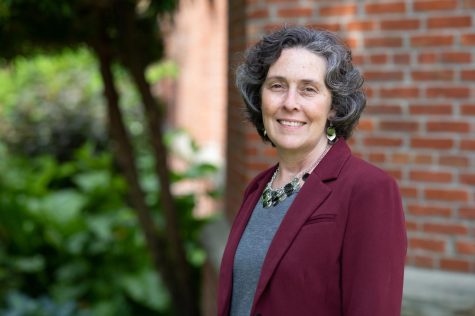Shrinking costs, rising cuts
Balancing the budget leads to future reductions
October 5, 2022
Seattle Pacific University is currently facing a budget shortfall and has plans to cut and reduce programs and faculty by 2025 in order to balance the budget and create a stabilized financial footing for the institution. Although the program to cut faculty is still in its early stages, there are already plans to review what programs are going to get cut and how to do so effectively.
Provost Laura Hartley discussed some of the potential plans and timelines surrounding the cuts.
“The goal will be to have essentially a list of cuts by the end of the academic year that will then be implemented over the course of several years,” Hartley said. “We’re still in the process of designing the process itself. I just need to emphasize that absolutely no decisions have been made yet. The process itself will largely be heavily faculty involved and driven.”

(Courtesy Seattle Pacific University)
For second year music therapy student Ana Burres, cuts in some departments have already begun to affect her and other students and their ability to get what they need out of the program.
“The music department has been taking cuts for quite a while now,” Burres said. “It’s a very intense program that expects a lot of hours and a lot of credits. There’s not a whole lot of help from professors because we have such budget cuts that limit professors’ ability to support our needs and our academic abilities.”
Burres would like to see more individual support for students after program reductions, as well as increased communications with faculty.
“I would want a lot of … conversations with my advisors with other degrees to see what is going to be best suited for the credits that I’ve taken to help me get my degree by the time that I expected to graduate,” Burres said. “I would like professors to be more hands-on with their students. A lot of things are done over email contact and over general class work.”
Third year ASSP member and politics, philosophy and economics major Rayna Martin shared her thoughts about future plans for the university.
“I know that it has been hinted in meetings that the transition from quarters to semesters is very likely and that there will be program changes because of that,” Martin said. “There will also likely be significant layoffs because of the 2025 cliff. SPU and small Christian colleges in general are at risk, and the biggest expense is usually faculty.”
According to Hartley, some reductions in faculty have already been made.
“Last year, for example, we had quite a few, about nine faculty retirements. In the process of working with the deans, we eliminated about six or seven faculty positions, so we just didn’t rehire for those positions,” Hartley said. “Similarly, some other positions where faculty have left or have retired, we’ve made the decision to either hold off on refilling a position or actually just to cut the position out of the budget.”
Additionally, Hartley discussed new income sources that are actively being searched for to stabilize the university’s financial situation.
“Along with cuts, we’re also looking very carefully at potential new sources of revenue. So that’s everything from potentially renting space in buildings the university owns, to creating new academic programs that would draw new students in,” Hartley said.
Hartley maintained that the university continues to focus on students throughout the process of balancing the budget.
“This is really important from a student perspective to hear about any decisions we will make, and again, it’ll be a while until we have these decisions, but any decisions we will make will directly impact programs in the university. We will always do that with a commitment to our students in mind,” Hartley said. “Any students studying in any undergraduate major or graduate program at this point, we will make the commitment for those students to complete their degree in that major in that program, even if a program ultimately is cut or you know, eliminated.”
Burres hopes that other programs are able to be improved if reductions happen.
“If programs are cut, I really expect the school to take initiative to fix the surrounding problems with other programs and utilize the resources that they’re trying to reserve as a way to improve the programs that they intend on keeping,” Burres said.
Martin believes that the cuts might be an unfortunate necessity to maintain the status of the university.
“To cut costs, you have to either cut faculty or charge students more, and usually when it costs students more the quality of education decreases more than if you’re laying off faculty, because if this is done correctly, you still can retain some variety without hurting enrollment,” Martin said. “Professors also deserve the chance to conduct programs to their fullest extent, and a skeleton program won’t be worth it for anyone.”

























































































